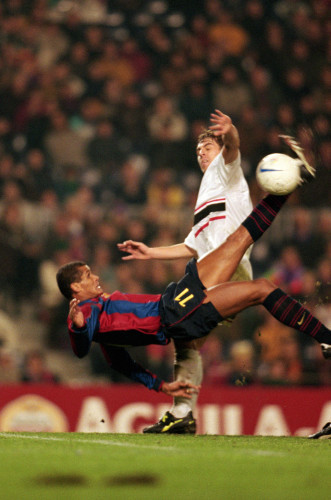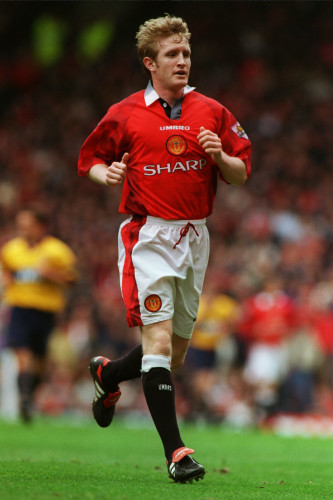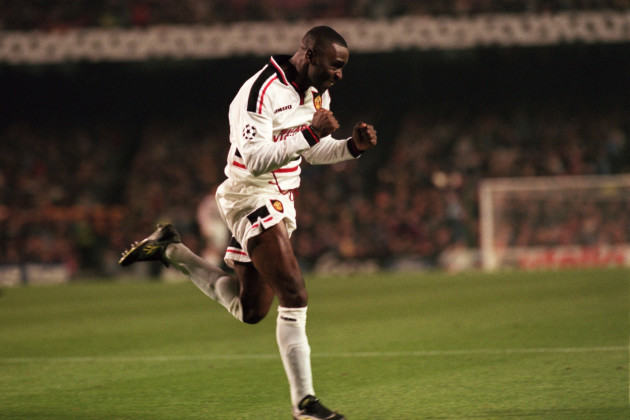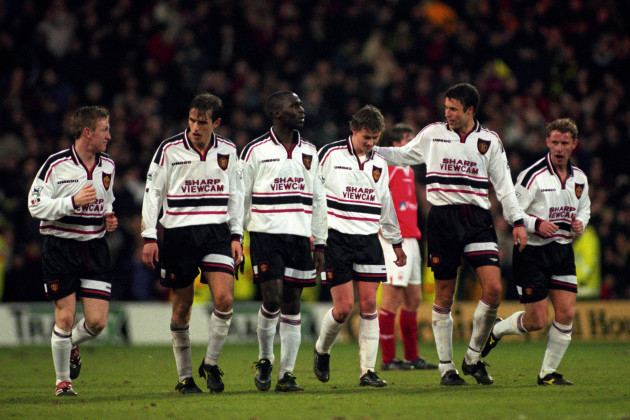ALEX FERGUSON WAS bullish in advance of the clash.
At the pre-game press conference, he spoke little of the opposition and instead listed off the various attributes of his fine side.
But there was little escaping the elephant in the room and he was quickly asked how much he remembered from the 4-0 hammering his team received on their previous visit to FC Barcelona.
“Nothing,” he replied, with a heavy hint of sarcasm.
But despite his attempts to play down the reference, the coverage surrounding the Group A fixture was dominated by exorcism-focused copy and how United were out for revenge.
Writing in The Guardian, David Lacey offered up a delicious opening paragraph that recalled the nightmarish encounter from the first week of winter in 1994.
Four years ago Manchester United retreated from the Nou Camp Stadium here with their tails so far between their legs that the team could have been renamed Manx United. Not only had they been beaten 4-0 by Johan Cruyff’s Barcelona but, as learning processes go, this one ranked with the roasting scene in Tom Brown’s Schooldays.”
Fergie wasn’t the only survivor from that evening quizzed on his memories.
“It was probably my worst experience in Europe,” Denis Irwin offered.
“We were absolutely battered, and it was one of those nights when you could say we were lucky to get nil.”
Infamously, in front of 110,000, Romario and Hristo Stoichkov cut United to pieces. The attacking duo combined for three goals while diminutive full-back Albert Ferrer got in on the act late on.
“We were well and truly slaughtered,” Ferguson said afterwards, the result substantially contributing to the team’s subsequent group-stage exit from the competition.
But, in November ’98, things were a lot closer.
As it turned out, the teams shared six goals – just as they had done back at Old Trafford a few months earlier – in what proved a Champions League classic.
With just over 20 minutes to go, it looked like United would claim a superb victory as Dwight Yorke headed home David Beckham’s expert cross at the near post to put them 3-2 ahead. But, just four minutes later, Rivaldo – who’d earlier given Peter Schmeichel the eyes and wrong-footed him with an expert free-kick – drifted between Jaap Stam and Gary Neville, chested down with his back to goal, flung himself in the air and planted an outrageous overhead kick in the same corner from eight yards.
It rubbished an opinion Ferguson shared with the press ahead of the game.
Without Romario, Barcelona no longer have a player who can conjure goals out of nothing.”
In fact, Rivaldo was the width of a crossbar away from claiming a hat-trick and all three points for his side as the hosts finished with a flourish.
And over two decades later, John Curtis still wryly recalls the frustrations and irritations following the Brazilian’s spellbinding display.
The full-back, who’d already made a couple of first-team appearances, was part of the United squad that night and watched on from the bench alongside another highly-regarded young player, Mark Wilson.
“The TV footage painted a great picture of my emotions, and Willo’s too,” Curtis tells The42 with a laugh.
“It was an incredible game of football but me and Willo were absolutely distraught when Rivaldo scored that bicycle kick because we lost our win bonus because of it. So, when the cameras panned to the bench, we looked absolutely devastated.”
I think it was ten grand but it might have even been as much as twenty. It was a significant amount of money for players earning about a £1000 a week. It made a difference. I’ll put it this way: I basically paid for my first house from my Champions League bonuses. When you were on the bench, you got half. I think you had to appear to get the whole thing. The beauty of it was that you had seven subs. Very often, I may not have been a sub for a Premier League game because they were only five spots. But, in the Champions League, there was a good chance I could make the bench. It mattered a lot to a bunch of 18 and 19-year-old kids.”
“But, regardless of that, what a fantastic experience for a kid to be involved in that kind of environment. It was front row seats to an amazing game. It wasn’t just a fantastic occasion for both clubs but for the competition on a wider scale. It’s regarded as a classic, really. I think there are certain stadiums that have something special and a character that’s difficult to replicate. Old Trafford has that, the Camp Nou has that – they are giant arenas, iconic venues. They have so much history about them. But as a player, you don’t really think about it much.”
“The difference between playing in the Camp Nou and playing against Chesterfield in League Two?” Curtis asks rhetorically, already laughing.
“When the fans are abusing you it gets pretty personal and you can hear every word.”
Curtis was a key part of United’s FA Youth Cup win in 1995 and was voted the club’s best young player two years later. Inevitably, the accolade dovetailed with a promotion to the fringes of the first-team and though opportunities were scarce owing to the dominance of Gary Neville, he remained a valuable member of the squad as Ferguson desperately tried to crack the Champions League puzzle.
“By 1998/99, I think it was a culmination of the younger lads having gained a bit more experience and nous and know-how regarding how to play that type of European tie…and the management as well, to an extent,” Curtis says.
“Because it was such a different thing. United played 4-4-2 consistently and it was pretty rigid, particularly in the early days of the Champions League. The gaffer very rarely changed it and it was only later on that he started to pack the midfield more. The philosophies were such that you didn’t change anything and United suffered in the early days because of that – against a Juventus or Barca that knew how to deal with European competition.”
In ’99, United were in an unusual situation.
Having finished as Premier League runners-up, they had to come through a qualifying tie against LKS Lodz before reaching the group stage. And because it was a 24-team format, the six group winners and only the two best runners-up progressed to the quarter-finals. With United drawn alongside Barcelona and Bayern Munich, there was a decent chance they wouldn’t finish top. So, numbers were potentially important. In six group games, United only won twice but they racked up 20 goals, easily the best tally of any team in the tournament. Bayern topped the group and United finished second but when it came to ranking the best runners-up, it was Real Madrid and United who moved on. Ultimately, the goal difference wasn’t required but Ferguson’s side had a natural attacking prowess that wasn’t exactly being tamed.
“United were just dominant at the time,” Curtis says.
I don’t want to say they were head and shoulders ahead because Arsenal were running them close domestically but they were at the very top of their game. And there was a philosophy to attack, to take the game to the opposition, to be on the front foot all the time. And in both games against Barca in the Champions League, it was two teams with the same mentality. Even the famous goal that Coley scored at the Camp Nou…Him and Yorkie were friends off the field. They had a telepathic understanding and we saw that all the time. The combination play from them…that type of goal constantly happened in training. It was just a regular event.”
“The format has changed a little bit as well so that means it’s less likely to get those types of score-lines anymore. You take the game last week and it was so cagey. United were almost set up to lose 1-0, knowing that if they go to Barca that they’ll have a chance with an away goal.”
That night in Barcelona was the closest Curtis would come to a Champions League appearance that season, narrowly missing out for the final against Bayern Munich. But, returning to the Camp Nou on that fateful May evening he – like so many others – was caught cold by the stunning finale.
“I was in the squad but just didn’t make the bench,” he says.
“It was me and Jordi (Cruyff) who missed out. Jonno (Jonathan Greening) and Wes Brown got picked ahead of us. So we were watching the game from the stands and me and Jordi looked at each other and said, ‘Right, will we head to the dressing rooms so we can commiserate with the lads?’ And we leave our seats to go down and the first goal goes in. There’s this massive roar and we run back up the stairwell and see everyone celebrating. And we think, ‘Wow, brilliant. 1-1. Let’s go down to pitch level and watch the rest of it from the tunnel’. Because Jordi was ex-Barca he knew the stadium and where everything was. So, we go down again and there’s another massive roar and we’ve won the game. So we actually missed both goals.”
Curtis still gets a tingle thinking on the memories from twenty years ago. Big games, big players, big expectations, big pressure. But, he’s quick to point out that he’d actually experienced all of that from the day he signed for the club in 1993.
“Because I’d come through the ranks, you don’t think of it any differently because you’re bred to be in that environment and to understand what’s required,” he says.
“You know the pressure on you. Even when you’re playing as a kid, everyone wants to beat you. You were the big boys and it’s something Manchester United have faced forever because they’re the biggest club in the country. As a player coming through the system, it becomes second nature to you. It’s only when you step away from the environment that you can look back and think, ‘Wow, that’s something special’. But I remember Jonno (Greening) joining from York and he was completely blown away when he arrived. He wasn’t bred in it so he’d comment on how different it was, in terms of his previous experience. And I’m sure certain players who signed from smaller clubs would say the same thing.”
After a loan spell with Barnsley, Curtis left United permanently in 2000 and signed with Blackburn. Later, there were stints with Leicester and Nottingham Forest but he’s now based in the United States and is the founder and technical director of the National Center of Excellence (NCE) where he specialises in developing underage talent.
He’s watched with interest as Ole Gunnar Solskjaer returned to the club and initially instilled a long-forgotten optimism and positivity. Curtis admits he under-estimated the Norwegian when they first met in 1996 and was taught a harsh lesson in misplaced instincts.
Still, he feels the club’s recent run of form shows his former team-mate still has a lot of work to do and that the hard questions are already being asked.
“I remember Ole walking through The Cliff and I was sat there with the other young kids and I’m thinking, ‘Who’s this guy?’” he says.
“Personally, I completely underestimated him as a player and he went on to prove me completely wrong. And the same with him as a manager. When he was announced I was on TalkSport radio and I was asked whether he was the man to bring back the glory days and the Premier Leagues, the European Cup triumphs, the domination and I was like, ‘No, but could he be part of a team to bring success back? Yeah, absolutely.’ At the time, it was all about Pochettino and Zidane. But what he’s done has been amazing. Again, he’s surprised me. They’re having a bit of a dip right now so it’s amazing how quickly things can change but he’s had a massive affect on turning things around.”
Sir Alex is a massive influence on him so he’s experienced the ruthlessness and the steely coldness that you need to be a top manager. But the honeymoon is over. It’s going to take a lot more than just making everyone relaxed and playing with smiles on their faces. His test really begins now, doesn’t it?”
Subscribe to our new podcast, The42 Rugby Weekly, here:





